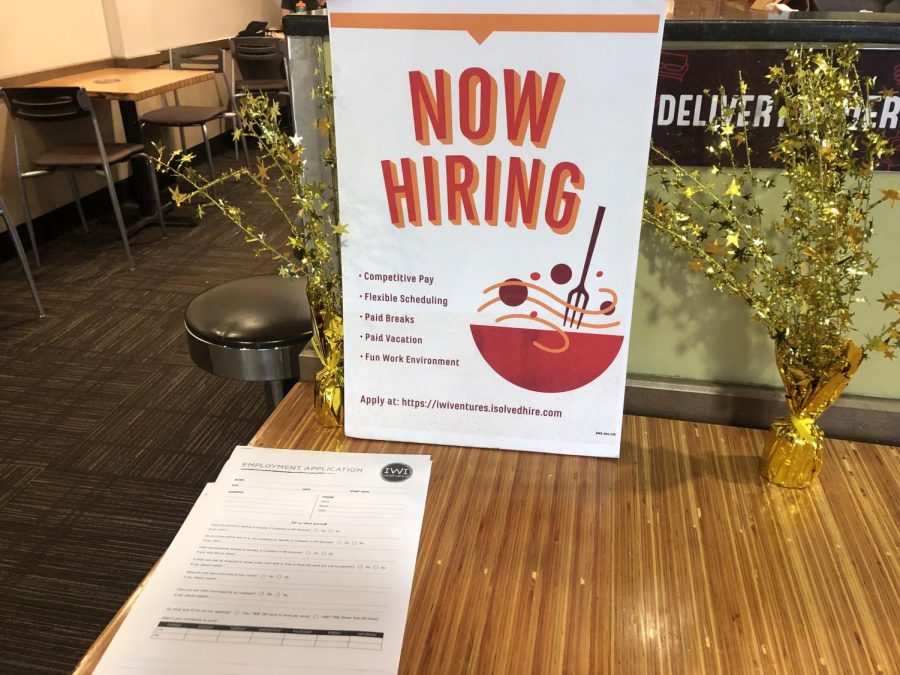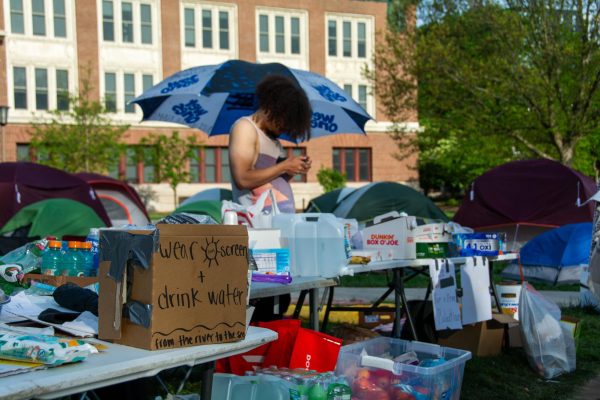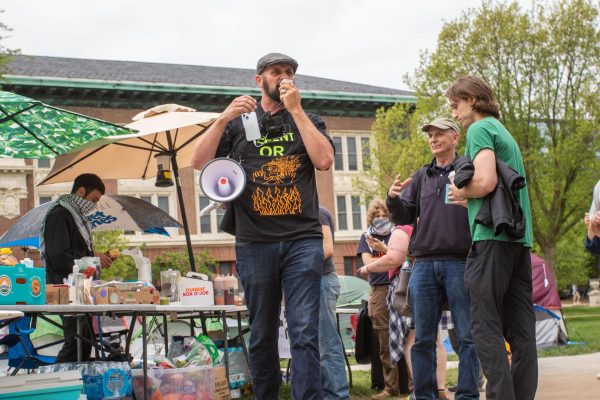Seniors say job hunt is scarce despite labor shortage
A now hiring sign sits on a table at Noodles & Company. College seniors say it is difficult to get a job despite the labor shortage.
December 11, 2021
A year and a half later, COVID-19 remains present in the United States, and graduating college students looking for jobs said they are suffering from it.
Lack of job options led Bella Chapman, senior in LAS, to start her own children’s book.
Chapman said writing the book took her about a month, and she was able to publish it within a six-month period. She said she plans to make it a series and has started writing the second book.
Before writing her book, Chapman had applied to multiple jobs, but said she found it difficult to find options that fit her requirements.
“Due to COVID-19 there was, like, a lot of limitations for what I could do because I didn’t want to put my family at risk,” Chapman said.
Get The Daily Illini in your inbox!
According to a study from Pew Research, based on the first three quarters of 2019 and 2020, 9.6 million workers in the U.S lost their jobs.
Pew Research Center’s American News Pathways project data shows that 25.3% of young adults ages 16-24 were unemployed in 2020. This was the highest rate of unemployment compared to other age groups.
A study from FiveThirtyEight said that the unemployment rate was at 4.8% in September.
Chapman said she receives 75 cents per book she sells. She said she gets a check with an average of $50 every couple of months from the sales of her book.
In order to be able to pay rent, Chapman said she got a job at a country club in Urbana through the recommendation of a friend who worked there.
Chapman said she had an easier time applying for jobs in customer service than for jobs related to her major. Even so, she said working in customer service was not her first choice.
“They’re just not very, like, maintainable jobs long term or like for paying expensive rent,” Chapman said.
Chapman said she is currently still looking for jobs post-graduation. She said she has put off applying to any positions as it was a topic that brought her stress.
Pew Research reported that 32% of those ages 18-29 had high levels of distress — the highest rate compared to any other age group.
“Now that I’m looking at them (job opportunities), and seeing that there’s really not that many options, it’s a little bit scary,” Chapman said.
“I always kind of imagined that I would just graduate college and have job opportunities, and I don’t think that’s going to be the case.”
Ariel Mckee, senior in ACES, said it took her a while to obtain her first job in a research facility.
“Getting a job in research was really difficult, it was like a several months long process,” Mckee said.
Before working in the research facility, Mckee said she had no prior experience with jobs related to her upcoming degree.
Mckee said she hopes that by the time she graduates with her master’s degree, labor shortages will have improved.
Compared to Germany, the World Health Organization, China and the European Union, the United States was voted by other nations to have the least efficient system in dealing with COVID-19, Pew Research said.
“I feel like within several years we could solve the issue (labor shortages) under, like, the right leadership,” Chapman said. “I don’t necessarily know if we have that right now.”
Junior Alexandru Grindeanu, junior in Engineering, said he believes COVID-19 will have a lasting impact on the United States.
“There will probably be some type of shortage for at least a few years,” Grindeanu said.
Over the summer, Grindeanu said the restaurant he worked at was almost always understaffed.
“This led to a lot of stress and overwork for the restaurant, especially during busy days,” Grindeanu said.
Next year being his senior year at the University, Grindeanu is worried the labor shortages will not improve.
Pew reports that including workers who were listed as “employed but absent from work for other reasons”, 17.8% of women and 14.5% of men were unemployed.
“I haven’t noticed that (discrimination) as part of my process, so maybe I’m pretty privileged,” Chapman said.
Chapman said she believes the pandemic has affected how companies pay their employees.
“I feel like many of the jobs I will be able to obtain after I graduate will just not feel required to compensate well because there aren’t that many options out there,” Chapman said.







